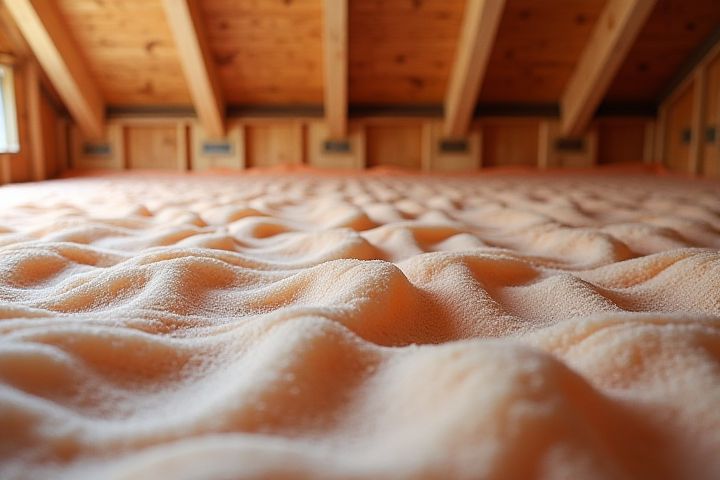
Insulation is essential for maintaining energy efficiency in your house, as it reduces heat transfer, keeping your home warmer in winter and cooler in summer. Effective insulation lowers your energy bills by minimizing the workload on heating and cooling systems, leading to significant cost savings over time. It also enhances indoor comfort by preventing drafts and ensuring a consistent temperature throughout different areas of the house. Moreover, proper insulation plays a crucial role in soundproofing, reducing noise from both external and internal sources, which is especially valuable in urban settings. Lastly, effective insulation can increase the overall value of your property, making it more appealing to potential buyers who prioritize energy efficiency and comfort.
Why A House Should Have Insulation
Energy efficiency improvement
Proper insulation significantly enhances energy efficiency in a house by minimizing heat loss in winter and keeping it cool in summer. According to the U.S. Department of Energy, well-insulated homes can see energy savings of 10% to 50% on heating and cooling costs, thus reducing utility bills considerably. Insulation forms a thermal barrier, allowing your HVAC system to operate efficiently, which can also extend its lifespan. By investing in high-quality insulation materials, such as spray foam or fiberglass, you enhance comfort while contributing to environmental sustainability through lower energy consumption.
Reduced energy bills
Insulation plays a crucial role in reducing energy bills by minimizing heat transfer, leading to more efficient heating and cooling. Homes with proper insulation can save up to 20% on heating and cooling costs, translating to substantial annual savings. By maintaining a consistent indoor temperature, insulation lessens the workload on heating and cooling systems, prolonging their lifespan and reducing maintenance costs. Investing in quality insulation not only enhances comfort but also significantly impacts your home's energy efficiency and overall expense management.
Enhanced indoor comfort
Proper insulation plays a crucial role in enhancing indoor comfort by regulating the temperature within your home. With effective insulation, you can maintain a consistent indoor climate, minimizing temperature fluctuations regardless of external weather conditions. This not only creates a cozy living environment but also contributes to better energy efficiency, leading to lower utility bills. Investing in high-quality insulation materials ensures that your home remains snug and pleasant, making it a more enjoyable space for you and your family.
Temperature regulation
Insulation in a house significantly enhances temperature regulation, maintaining a comfortable indoor climate regardless of external weather conditions. By minimizing heat transfer, effective insulation keeps your home warm during winter and cool in summer, reducing reliance on heating and cooling systems. This energy efficiency not only leads to lower utility bills but also decreases your carbon footprint. With proper insulation, you can ensure a stable temperature, resulting in a healthier living environment.
Moisture control
Proper insulation plays a crucial role in moisture control within your home. When insulation is correctly installed, it helps prevent condensation, which can lead to mold growth and structural damage. In fact, homes with good insulation can reduce moisture levels by around 30%, contributing to a healthier indoor environment. By maintaining consistent temperatures, insulation minimizes the chances of cold surfaces that attract moisture, ultimately protecting your property and enhancing air quality.
Noise reduction
Insulation significantly reduces noise transmission, creating a quieter and more peaceful living environment. The effectiveness of insulation in noise reduction is measured in Sound Transmission Class (STC) ratings, with higher STC values indicating better soundproofing; for instance, fiberglass insulation typically has an STC rating between 21 and 30. By incorporating insulation materials like spray foam or cellulose, you can achieve a noticeable decrease in external noises such as traffic or construction, enhancing your overall comfort. Investing in quality insulation not only ensures tranquility but also contributes to increased property value and energy efficiency.
Increased property value
Insulation significantly boosts your home's property value, appealing to potential buyers who prioritize energy efficiency and comfort. Homes with superior insulation can reduce energy bills by up to 30%, making them more attractive in the real estate market. Moreover, well-insulated homes often meet modern building codes, which can be a selling point for environmentally conscious buyers. Investing in insulation can yield a return on investment of over 100% when you sell, making it a strategic enhancement for your property's overall value.
Eco-friendly benefits
Insulation plays a crucial role in enhancing energy efficiency in homes, drastically reducing heating and cooling costs by up to 30%. Eco-friendly insulation materials, such as cellulose, sheep's wool, or recycled denim, contribute to lower carbon footprints by minimizing energy consumption. By maintaining a stable indoor temperature, insulation also decreases reliance on fossil fuels, cutting greenhouse gas emissions significantly. Choosing sustainable insulation options not only benefits the environment but also enhances your home's comfort and resale value.
Reduced carbon footprint
A well-insulated house can decrease energy consumption by up to 30%, significantly lowering greenhouse gas emissions associated with heating and cooling. This reduction in energy usage directly contributes to a smaller carbon footprint, which is crucial in combating climate change. Each square foot of insulation can prevent roughly 5 to 15 pounds of carbon dioxide emissions annually, emphasizing its environmental benefits. By investing in high-quality insulation, you not only enhance your home's energy efficiency but also take a meaningful step towards a more sustainable future.
Protection against temperature extremes
Insulation in a house plays a crucial role in regulating indoor temperature, providing effective protection against extremes of both heat and cold. In winter, quality insulation can prevent heat loss, maintaining a cozy indoor environment and potentially reducing heating costs by up to 30%. Conversely, during the summer months, insulation serves as a barrier against excessive heat, helping to keep your home cool without relying heavily on air conditioning. By investing in proper insulation, homeowners can achieve more consistent temperatures year-round, enhancing comfort and energy efficiency.
